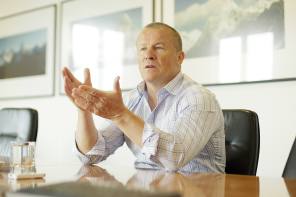
So confident were Neil Woodford’s team that the Equity Income fund was going to hit its target in December that a series of roadshows had been scheduled for November.
Advisers who hold more than £2bn of client money in Woodford had been invited.
I understand that very tentative enquiries had suggested that around £600m to £700m of this was likely to stay in the fund.
From elsewhere, Woodford’s team believed a further £300m would have remained.
This is not so incredible if you think about it, even given all that has happened.
Making sensible investment decisions is about judging what you think will happen in the future, not what has happened.
Clearly some thought the future looked brighter for the so-called Oracle of Oxford – until he closed Woodford Investment Management.
Ironically, for the first week or so after the closure, the Equity Income fund has performed very well, largely buoyed by the likelihood of a Brexit deal.
‘Don’t invest for the politics, invest for the economics,’ is an expression I am fond of.
In a way, this was where Mr Woodford was different from when he successfully bet against the banks before 2007 and tech stocks before 2000.
These were decisions based on fundamentals around the valuations of these sectors.
But taking a bet on Brexit as Mr Woodford did this time round was based on a series of political unknowns around trade tariffs, access to markets and regulations. Mr Woodford was never going to be able to call all of these things.
He may have been right, but we will never know now. Mr Woodford’s team would have found out by late November whether the fund would have been able to keep going.
It was then that investors were to be asked what their intentions were on reopening.
They would have got a clue as to the level of redemptions and been able to manage outflows.
So it does remain a mystery (at least at the time of writing) as to why Link acted when it did to close the fund down.
Link blamed the slow sell-off of the unquoted stocks, but this was a process it was in charge of.
The over-riding lesson to be learned about the Woodford affair though is disclosure.
Many think that Woodford’s undoing was his total transparency over stock selection, which in turn allowed some to short his stocks. But that is not why they shorted them, they shorted them because they were rotten bets.
Actually, what investors need is more transparency in the form of better explanations about what is happening in a fund.
Had investors known that in February and March 2018 Mr Woodford had breached limits on unquoted stocks, or that the liquidity profile had worsened until April 2019, then perhaps many would not have lost so much money.
The Woodford affair is a chance to look forward, to better regulation and disclosure, not an opportunity to make investing even more opaque than it is.
Speaking up
The world is full of know-it-alls, and as usual there are many who claim they saw the Woodford scandal coming.
Few ever do though. But a hat-tip has to go the likes of Tilney Investment Management, whose analysts sent a sell note in March 2018 that warned of problems with liquidity and redemptions.
Or those slightly crazed bloggers who also raised concerns about the number of unquoted stocks Woodford held at around the same time.
Seeing something comingis one thing, actually doing something about it isentirely another.
This is an area where I encourage advisers to speak up all the time. Many saw where Woodford was going but were not brave enough to speak up.
If we ever want the financial advice market to thrive, then having the confidence to voice concerns when one company is going astray is the only way to achieve this.
Glass houses...
Mr Woodford is not a monster. He is a man who made some terrible decisions. It made his success look like greed, his confidence look like arrogance.
And he has lost people lots of money, so it is only right that investors should be angry. Yes, he had a fast car, and stables – but so do manyCity workers.
There are also many fund managers who have worse performance than him who are still enjoying all these trappings. This was not just the failure of a man, it was the failure of a system.
James Coney is money editor of the Sunday Times




